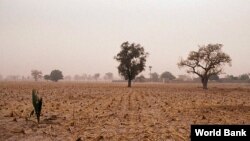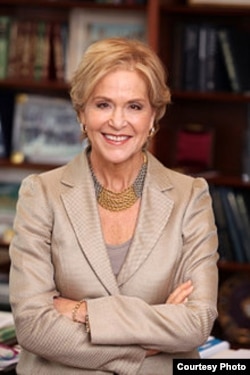New efforts by the Rockefeller Foundation are working to strengthen African economies as they face a growing number of young people, and challenges to their economies from the effects of climate change.
The group’s president, Judith Rodin, who has authored a new book titled ‘The Resilience Dividend,’ said the foundation is working to strengthen agriculture, water and health systems as well as boosting the technology sector.
She said $100 million was being channeled through an initiative called Digital Jobs Africa in six countries: Ghana, Kenya, South Africa, Nigeria, Morocco and Egypt.
“We are excited to see so much opportunity and such a growth market in the ICT more broadly across the continent,” she said.
"[There are] so many technology parks growing [and] so many companies really growing on technology-based platforms. We know that … the continent has to focus on employing this extraordinary youth bulge that we are going to see. We think…a critical part of shared prosperity as we go forward [means] developing growth in the ICT sector which often yields some of the better paying jobs,” she continued.
Africa’s health and prosperity does not only depend on high technology. Rodin says the continent is also experiencing unprecedented ‘shocks and stresses’ as a result of climate change – from drought to flooding. Millions of lives are at risk.
“[In our work in Africa and South East Asia] we have seen challenges,” she said, “ … certainly climate shocks increasing drought, heat and flooding --either too much rain or too little rain all across the African continent in each growing season. So the impact on agriculture is significant; certainly the impact on livelihoods significant."
Averting the crisis?
She said the Rockefeller Foundation is working to help small farmers deal with the effects of climate change. It’s collaborating with partners to improve water management so run-off from flooding can be used to irrigate fields. In partnership with The Alliance for a Green Revolution in Africa, the foundation is helping to develop drought-resistant seeds.
Also, the Rockefeller Foundation and the World Food Programme (WFP) have developed a technology called risk metrics to help predict an impending drought.
“We then created, and the African Union is now running a country level insurance mechanism where the country can buy insurance against the next climate-related vulnerability," she said. "What that does is allow them to get access to resources immediately rather than waiting for development aid, once the crisis has occurred, as well as preparing for it more effectively because they have an earlier warning system in the process. That insurance-like mechanism is one piece of the solution. "
Message to smallholder farmers
Rodin sees potential in African agriculture. She was inspired after visiting a group of mango farmers in Kenya, who have teamed up to find new markets for their crops.
“The message to the small holder farmer,” she said, “ is ‘Think like a business person. Think about all of the ways you can use your crops. Think about what joining with your neighbor might do in terms of increasing your productivity and your ability to gain more access to bigger markets that will allow you get more for your product.’”
The Rockefeller Foundation is also helping African governments with another issue affected by climate change: the spread of disease.
“We know because of climate change that more infectious diseases have been skipping from animals to humans,” she said. “As we see these changes we have got to prepare both health workers and health systems to develop the capacity for early warning, early monitoring and more effective responding.”
Rodin said these and other projects include critical market based solutions that should help Africa continue to develop. She encouraged governments to refine their policies to help guarantee their success.






